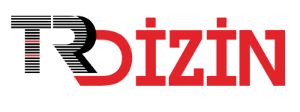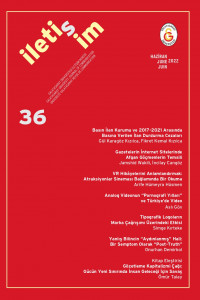Research Article
Book Review
Issue Editorial Board


Aim & Scope
The main purpose of the journal is to contribute to communication sciences field by publishing new and authentic work from a variety of disciplinary perspectives with solid theoretical background.
İleti-ş-im features original academic essays dealing with a wide range of subjects related to communication sciences (radio, television, cinema, journalism, public relations, advertising, new media, etc.) in Turkish, English and French, along with translations, book reviews and conference papers.
Author Guidelines
Peer Review Process
All submissions received by İleti-ş-im are reviewed first by the Editorial Board and then by (at least) two experts. During the appointment of the experts are taken into account: academic titles of the author(s) and the reviewers, coherence between the subject of the paper and the research area of the reviewers. The evaluation process by experts is anonymous.
The final decision on publication or rejection of a paper is made by the Scientific Committee. The remarks of the latter are sent to the author(s) with the reports of the experts within approximately four months following the date of submission. Accepted manuscripts are scheduled for publication according to the date when they were submitted.
During the evaluation process, online plagiarism prevention program İThenticate is also used. Manuscripts with similarities to other resources or quotations which do not comply with academic norms are automatically eliminated and their authors are banned from publishing in the following issues of the journal.
When evaluating a paper, reviewers are asked to provide answers to the following questions:
1- Do the title and the subtitles reflect the content of the article?
2- Does the abstract clearly describe what the author(s) hoped to achieve, state the problem being investigated and indicate the main results?
3- Does the article bring a significant contribution to the social sciences (as well as to the communication sciences)?
4- Is the methodology applied is appropriate regarding the purpose of the article?
5- Are the concepts used in the article adequate for answering the question posed?
6- Is the manuscript properly written and of sufficient quality in terms of language and style?
7- Does the article provide relevant, up to date and adequate references?
8- Are the figures and tables (if any) accurate and adequate?
9- Would you refer to this article if you were working on the same subject?
Submission Policies
1- Submitted papers should be unpublished and not under consideration for publication elsewhere.
2- Papers previously presented and published at a symposium, conference or similar academic events are not eligible for submission.
3- Translations which are deemed to be capable of contributing to the field can be published with the decision of the Editorial Board without recourse to review process.
4- Manuscripts sent should be at least 6000 words long and no longer than 9000 words including abstracts, endnotes and references.
5- Manuscripts must include abstracts not exceeding 150 words, written in Turkish, English and French and key words. Abstracts should clearly describe the content, purpose, methodology of the article and indicate the main results.
6- Submissions should include a title page with author details: The name, affiliation, academic title and contact information (address, phone number, fax, e-mail) of the author(s). A short biography written in the third person, not exceeding 150 words and summarizing research areas and main publications of the author(s) should also appear on this page.
7- Manuscripts must be in the form of a docx, doc or odt file, in Times New Roman font, size 12 with 1.5 line spacing. Page numbers should be on the top center and the first line of each paragraph should be indented 1.25 cm. Additional information can be given in auto numbered footnotes, size 10 with single-line spacing.
8- Headings should be unnumbered, bold with first letter capitalized. All the headings should be indented 1.25 cm and only subheadings should be in italics.
9- Figures and tables should be numbered, properly placed in the text and have titles on the top. Only the title should be bold, not the legend (Example Table 1. Legend).
10- Short quotations should be enclosed in double quotation marks in the text and if quotation marks are needed in the quotation, single quotation marks should be used. Quotations exceeding 40 words should be set out as a separate block indented 1.25 cm (with no extra indent on the first line), without any quotation marks and with single-line spacing. While quoting, omissions of words and sentences from the original text should be indicated with ellipsis in brackets (...).
11- The titles of books, journals, newspapers, movies and programs should be in italics in the text. Numbers can be given consistently in figures or in words. In texts written in Turkish, when indicating date, the day must be followed by the month.
12- The authors are solely responsible for their articles. The opinions expressed in the articles published are the authors' own and do not necessarily reflect the views of İleti-ş-im.
13- The journal does not have any article processing charges (APCs) or submission charges.
14- The copyright of the accepted articles belongs to the author(s). No fee is paid to the author.
References Guidelines
1- In-text references and bibliographies of all submitted papers should follow APA Editorial Style specified by the Publication Manual of the American Psychological Association (6th Edition).
2- All in-text references should include the last name of the author and year of publication followed by page numbers when directly quoting the author’s words (Barthes, 1975, p. 104). For citing the same source, the same method should be followed and abbreviations such as ibid. should not be used.
3- For joint authors, both last names should be given (Lipovetsky and Charles, 2004); for three or more authors, the first author’s last name should be followed by et. al. (Jenkins et. al., 2009). When citing multiple sources, the references should be separated with a semicolon (Alemdar, 1999; Oskay, 1994).
4- More than one reference from the same author in the same year must be identified by the letters “a, b, c” (Cassetti, 2011a) and these letters should be consistent with the list of references at the end.
5- Depending on whether the name of the author cited is mentioned or not in the text, secondary citations should be given as follows: (as cited in Elsaesser, 2004, p. 82) or (Musser, as cited in Elsaesser, 2004, p. 82)
6- The list of references should include only the sources cited in the text. Regardless of type of source, all sources must be listed first alphabetically by author last names and then chronologically.
7- Various examples of works cited in APA format can be found at this link:
http://www.bibme.org/citation-guide/apa/
Ethical Principles and Publication Policy
İLETİ-Ş-İM Dergisi Etik İlkeler ve Yayın Politikası
İleti-ş-im dergisi Türkçe, Fransızca veya İngilizce olarak yazılmış makalelerin çift kör hakem sürecinden sonra yayınlandığı bir akademik dergidir. Dergide ağırlıklı olarak yaratıcı araştırma tasarımlarıyla elde edilen ve özgün bulgular sunan makalelere yer verilmektedir. Makaleler dışında kitap eleştirileri, alana katkı sağlayacak çeviriler de dergide sınırlı sayıda yer alabilmektedir.
Dergiye gönderilecek makalelerin daha önce bir yerde yayınlanmamış olması gerekmektedir. Tebliğ olarak sunulmuş ve sonra makale formatına uygun hazırlanmış olan çalışmalarda bu durum ilk sayfada belirtilmelidir. Dergi, sadece online olarak, yılda iki kez (Aralık ve Haziran aylarında) yayınlanır. Ayrıca dergi her yıl en fazla (Kasım ve Mayıs aylarında) iki özel sayı yapabilir.
Editör grubu, özgün, bilimsel ve literatüre katkı veren makalelerin yayınlanması için çift kör hakem sürecini başlatır. Gerekli görülen durumlarda üçüncü hakeme başvurulur.
İleti-ş-im Dergisi’nin imtiyaz sahibi ve genel yayın yönetmeni Galatasaray Üniversitesi İletişim Fakültesi dekanıdır. İleti-ş-im dergisi ve Galatasaray Üniversitesi arasında mutlak editoryal bağımsızlık bulunmaktadır.
Dergi hiçbir aşamada ücret talep etmez.
İleti-ş-im dergisi Yayın Etiği Komitesi’nin (Committee on Publication Ethics – COPE, https://publicationethics.org/) hazırladığı yönergeye göre hareket eder.
Değerlendirme ve Yayın Süreci
Dergipark üzerinden yüklenen makaleler, editör tarafından gerçekleştirilen ön değerlendirme ve intihal raporunun alınması sonucunda, değerlendirme sürecine alınır ya da doğrudan reddedilir. Yayınlanmak üzere başvurusu yapılan makaleler, aranılan akademik yetkinlikte değilse veya derginin “Etik ilkeler ve Yayın Politikası”na uygun değilse hakem süreci başlamadan reddedilir. Ön kontrolü geçen makaleler çift kör hakeme gönderilir. Gerekli hallerde makaleler üçüncü hakeme gönderilebilir. Hakemler veya editör grubu yazardan, çalışması ile ilgili düzeltme ve değişiklik isteyebilir.
Yayın kurulu, hakem süreci biten makaleler için yayınlanmadan önce yapılan toplantıda görüş bildirir.
Yazar her aşamada makalesini geri çekme hakkına sahiptir.
Editoryal Sorumluluk
Editörler gelen her yazıyı öncelikle İleti-ş-im dergisi Etik İlkeleri ve Yayın Politikası çerçevesinde inceler. Editörler bir metnin kabul edilmesi veya reddedilmesi konusunda sorumluluk sahibidirler. Bu kararı alırken fikri mülkiyet haklarına, çalışmanın bilimsel etiğe uygunluğunu ve literatüre yapacağı özgün katkıyı göz önüne alırlar.
Editörler, değerlendirme sürecine alınacak makalelerin seçiminde kamu yararı üzerinden karar verirler ve kurumlardan bağımsız hareket ederler.
Editörler, dergiye gönderilen çalışmaları hakemler, yayın kurulu ve yazarlar dışındaki kimseyle paylaşamaz.
Fakülte içinden gelecek makalelerin değerlendirme sürecinde, hakemler fakülte dışından olmalıdır.
Her makalede en az bir hakem de yine fakülte dışından olmalıdır.
Yazarların Sorumlulukları
Değerlendirme için gönderilen bütün çalışmalar özgün olmalıdır ve intihal içermemelidir.
Yazarlar en doğru biçimde, derginin formatına uygun olarak atıf yapmalıdır.
Yazarlar cinsiyetçi, ötekileştirici ve ayrımcı bir dil kullanmamalıdır.
Yazarlar çalışmaları için aldıkları hibeleri, destekleri yazıda dipnot olarak belirtmelidirler.
Yazarlar, anket, gözlem, deney, görüşme, odak grup çalışması gibi yöntemlerle gerçekleştirdikleri veri toplama süreçlerinde etik kurul izni almış olmalıdır. Gerekli makaleler için alınan etik onay belgesini, yazar makaleyle beraber göndermelidir.
TR DİZİN tarafından alınan karara göre makalelerde “Araştırma ve Yayın Etiği”ne uyulduğuna dair ifadeye yer verilmelidir.
Başkalarına ait ölçek, anket veya fotoğraf kullanımlarında sahiplerinden izin alındığı açıkça belirtilmelidir. Makale için kullanılan fikir ve sanat eserleri için telif haklarına uyulduğu belirtilmelidir.
Derleme makaleler için etik kurul onayı gerekmez.
Tezlerden üretilmiş makaleler için etik kurul onayı gerekmez. Ancak bu makalelerin tezden yapıldığı dipnot olarak çalışmada belirtilmelidir. Tez makaleleri tek yazarlı olmalıdır. Yazara destek sağlayan kişiye teşekkür açıkça belirtilir.
Yazarlar üniversitede çalışmıyorsa bölgelerinde bulunan etik kurullara başvurabilirler. Etik kurulu onayı gerekmiyorsa bu ibare, yazıda dipnot olarak belirtilmelidir.
Telif Hakkı Devir Formu yazar tarafından doldurulmalıdır. Makaleler ile beraber bu formlar da dergiye gönderilmelidir.
Yayın Kurulu
Yayın Kurulu her iki yılda bir değişikliğe gidebilir. Yayın kurulunun seçimiyle her iki yılda bir editör değişikliği yapılır.
Yayın Kurulu, “İleti-ş-im dergisi Etik İlkeleri ve Yayın Politikası”nı kabul eder ve kararlarını bu doğrultuda alır.
Yayın Kurulu, Dergi’nin Bilim Kurulu için üye önerisi yapar.
Hakem değerlendirmesi biten makaleler üzerine toplanan yayın kurulu, yine de intihal veya çıkar çatışması veya telif hakkı ihlalleri gibi yayın etiğinin ihlal edildiği şüphesinde, Dergi’nin editör ekibini bilgilendirir.
Hakem
Hakemlere makale değerlendirme teklifi sunulduktan sonra, bir hafta içinde herhangi bir geri dönüş olmazsa, o hakem yerine bir başka hakeme değerlendirme teklif edilebilir.
Hakemler kendilerine değerlendirmeleri için gönderilen makalelerde herhangi bir intihal, metin dönüştürme veya kendileriyle ilgili çıkar çatışması yaratacak bir durum tespit ederlerse editöre bildirmelidirler.
Hakemler kendilerine gönderilen çalışmaları adil ve tarafsız bir biçimde değerlendirmek ve kör hakem sürecinin gerektirdiği gizliliği korumakla yükümlüdürler.
Hakemler değerlendirdikleri yazıyı editör grubu dışında kimseyle paylaşmamalıdır.
İntihal Raporları
Makale değerlendirme sürecine alınmadan önce intihal programı aracılığıyla benzerlik kontrolü yapılır. Referanslarla beraber bu oran %20’yi geçmemelidir. Bu oran, eğer makale tezden veya ödevden üretilmiş ise, benzerlik oranı %50’yi geçmemelidir. Belirtilen oranlar aşıldığı zaman yazardan değişikliğe gidilmesi istenir.
Özel Sayı Editörleri
Özel sayı editörleri, sorumluluğunu üstlendikleri sayıları hazırlarken, Dergi editöründen uyması beklenen “İleti-ş-im dergisi Etik İlkeleri ve Yayın Politikası”nı da kabul etmiş olurlar.
Özel sayı editörlerinden, gerekli görülen durumlarda o sayıya ait belgeleri paylaşmaları istenebilir.
Telif Hakkı Düzenlenmesi
Yazar, Dergi’ye yazı gönderdiğinde ve yazısı yayınlandığında, yazının ilk kez yayınlanma hakkının İleti-ş-im dergisine ait olduğunu kabul eder.
Yazar, “Telif Hakkı Devri” Formunu imzalayarak, çalışması ile beraber Dergipark’a yüklemek zorundadır.
Creative Commons Attribution ilkelerine göre, yazar çalışmasının
ilk kez İleti-ş-im dergisinde yayınlandığını belirterek, sonraki yayınlara
izin verebilir.
Gizlilik Beyanı
İleti-ş-im dergisine gönderilen yazılarla ilgili yazarların veya hakemlerin iletişim
bilgileri, 6698 sayılı Kişisel Verilerin Korunması Kanunu kapsamında
üçüncü kişilerle ve kurumlarla paylaşılmayacak, sadece dergi için
kullanılacaktır.
Price Policy
Galatasaray Üniversitesi İleti-ş-im Dergisi ücretsiz olarak yayın yapan bir dergidir. Makalelerin yayınlanma sürecinde hiçbir ücret talep edilmemektedir.







